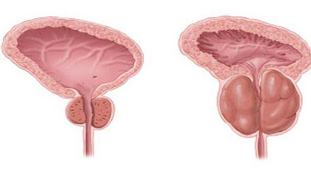The inflammation of the prostate, unfortunately, it is quite common for the disease. According to statistics almost half of the men one way or the other-age face this problem. The causes of the inflammation can be different, and therefore in modern medicine are distinguished several types of this disease. One of them is bacterial prostatitis.

Given the high incidence of the disease, many men are interested in more information about him. What are the causes of inflammation? What are the symptoms that are worth paying attention to? What are the current methods of treatment are the most effective?
What is the prostate? The main forms of the disease
Before examining the question of what is bacterial prostatitis, it is worthwhile to understand what represents the prostate gland, or prostate. It is a small organ that is part of the reproductive system. It is located a little below the bladder, around the urethra. The prostate makes up 70 percent of the seminal fluid, which is then mixed with the semen, which is formed in the testes. Also, the prostate gland plays a role in the process of emission of sperm and maintains the erection. In addition that affects the retention of the urine.
Prostatitis is a disease that is accompanied by inflammatory process in the tissues of the prostate. Depending on the causes of the development of modern medicine are distinguished several main types of the disease:
- acute bacterial prostatitis is the inflammation in this case develops in the background of the infection by organ-specific bacteria (for example, chlamydia, gonococci, etc);
- the chronic form of bacterial prostatitis, usually, develops in the bottom spot of the therapy, or lack of it (the illness lasts more than three months, the period of welfare changes the aggravations of inflammatory process);
- non-specific prostatitis — inflammatory process with this disease due to the activation conditional pathogens of the intestinal flora, or not associated with a bacterial infection;
- asymptomatic inflammatory prostatitis develops without any symptoms, and very often the inflammatory process is extinguished by itself.
The cause of bacterial prostatitis
As it says in the name itself, the inflammatory process in this case, is related to the activity of bacteria and micro-organisms. The causative agents of bacterial prostatitis often penetrate into the tissue of the prostate when the patient has the diseases, sexually transmitted infections. Almost any sexually transmitted disease (e.g. gonorrhoea, chlamydia, can lead to the inflammation of the prostate.
Middle-aged men as a stimulant can act and shareware of pathogenic microorganisms such as escherichia coli. A little bit of the another image that is seen in patients of advanced age. The fact that many of the men over 50 years of age, was diagnosed with the so-called benign prostatic hyperplasia (accompanied by an increase of the tissue). In this type of pathology of the evacuation of the secretory fluid of the prostate difficult, due to which she begins to accumulate in the interior of the breast. The stagnation of the secret leads to an active multiplication of pathogenic microorganisms and, consequently, inflammation.
Also bacterial prostatitis can develop in the background of various pathologies of the urinary system. For example, the inflammation is more often diagnosed in the bottom of the bladder obstruction, urinary tract infection, epididymitis, urethritis. The diffusion and penetration of the infection in the interior contributes to the phimosis (fusion extreme of the flesh). Cause the inflammation of the prostate can be several lesions in the crotch, the installation of urinary catheter, previously made tsistoskopiya (internal inspection of the bladder) or by a biopsy.
Are there risk factors?
As you can see, the causes of the inflammation of the prostate may be different. In addition, there is a group of the so-called risk factors, whose presence increases the probability of developing both acute and chronic prostatitis:

- frequent infectious diseases of the nervous system;
- parasitic diseases;
- the incomplete emptying of the bladder;
- the genetic predisposition;
- the irritation of the urinary canal of aggressive chemicals;
- a strong hypothermia;
- disorder of the sexual life (frequent change of sexual partners, and contacts, without the use of condoms);
- smoking, consumption of drugs and alcohol (weakens the defenses of the body);
- weakened immune system;
- the long periods of sexual abstinence;
- dehydration of the body;
- bad nutrition;
- neurological disease of the urinary tract;
- permanent, stress, nervous exhaustion, emotional surge;
- the sedentary lifestyle, which leads to a stagnation of blood in the pelvis (increasing the likelihood that inflammation is not only the prostate but also in a few other places of organs).
What symptoms are accompanied by disease?
Symptoms of bacterial prostatitis is usually quite specific. The disease begins acutely and develops quickly. Often, the patients in the first place, indicate an increase in body temperature, weakness, pain in the body, fatigue, muscle aches, nausea, and vomiting.
Along with this, there is a problem with the functioning of the urinary system. The process of urination becomes difficult and painful, the need - more frequent. However, with the bladder empty. The jet urination becomes weak, the urine acquires a rather unpleasant smell. May also be present small impurities of the blood. It is possible the appearance of pain and burning sensation in the urethra canal.
Patients often notice and other symptoms of bacterial prostatitis. In particular, it appears a pain in the field of lobka, that also occurs in the lower part of the back. You may experience pain in the testicles and the area of the crotch. Men are problems with erection and ejaculation is accompanied by painful sensations. Sometimes in semen can observe traces of blood. Also the pain are present at the time of defecation.
To realize the yes of these symptoms, you should contact a doctor immediately. The sooner the patient receives quality health care, the lower will be the probability of transition of the disease in a chronic form.
Chronic a bacterial prostatitis
Immediately it is worth noting that this form of the disease is quite rare. Chronic a bacterial prostatitis may be related to the activity of the bacteria, which are protected from the effects of the drugs, as they are deeply in the tissues of the prostate. In addition, some microorganisms become insensitive to the broad-spectrum antibiotics exposure.
The exacerbation of the chronic bacterial prostatitis is accompanied with almost the same symptoms as the acute form of the disease. Pain occurs when urinating, pain in the belly and the crotch, the presence of blood in the urine and the semen. On the other hand, the increase of the temperature, and other signs of intoxication of the body are rarely observed. The exacerbation of the changes due to a period of relative well — being of a man, it feels good, but some irregularities in the functioning of the urinary system. In particular, patients suffering from different urination. It is also observed erection problems (sometimes up serious frequent erectile dysfunction (ed) and decreased libido.
The diagnosis of the disease
For a start, the doctor performs a physical exam and gathers your medical history, to obtain a complete picture of the symptoms that bother the patient. As a general rule, it is enough to suspect of prostatitis and assign an additional analysis.

The patient gives samples of blood and urine, analysis that helps to detect the markers of inflammation. Also it is necessary a digital rectal examination of the prostate that gives the doctor can determine the size, contour, consistency of the authority, the degree of pain and some other parameters. In addition to this, during a prostate massage you can get samples of their secrets, which are then sent to a laboratory for analysis. The seeding of the samples help to determine the type of infection and the degree of their sensitivity to some medications.
Most research is conducted only in case that we suspect the presence of complications. By cystoscopy, the doctor can examine and assess the status of urinary canal and bladder. Sometimes you can perform urodynamic tests. The transrectal ultrasound and the ct scan helps to better understand the state of the prostate, to detect the presence of abscesses or stones. If you suspect malicious rebirth of cells, a biopsy is performed of the prostate.
Treatment of prostatitis
After a thorough study examination, the doctor can make the most effective scheme of therapy. As a general rule, in the first place, is assigned the treatment of bacterial prostatitis to antibiotics. In particular, it is quite effective anti-bacterial properties of the media are considered medications that contain tetracycline and ciprofloxacin. Depending on the severity of the disease and the type of infection therapy antibacterial can last four to six weeks. Sometimes, in the early days of the medication was injected intravenously, and then pass into the form of tablets. In the chronic form, the inflammation, the treatment can last up to 12 weeks.
Also other medications are used for the treatment of bacterial prostatitis. In particular, to facilitate the patient's condition can be anti-spasmodic, which promote relaxation of the bladder neck and reduce the pain during the urination.
If necessary, the patient is prescribed analgesics drugs, namely nonsteroidal anti-inflammatory agents, which also help to relieve the fever. Positively on the situation of the men affect the reception of multi-vitamin complex, immune modulators, biostimulators.
Other methods of treatment
In the phase reconstructive patients often recommend to perform prostate massage. This procedure helps to remove the stagnation of liquids, improve the fabric of change, improve immunity, local, restore the drainage, the function of the prostate, as well as the increase of the inflow of blood.
Also in the process of treatment can be used different physiotherapy techniques, in particular:
- magnet;
- transrectal ultrasound therapy;
- the electrostimulation.
All of these techniques contribute to the normalization of the circulation of the blood and the solution of the stagnation of the processes.
When due to a surgical intervention?
Surgery is the last resort. Applies only if the long term medication therapy and other treatments do not give any effect. Surgical procedure of partial resection of the gland of the prostate is carried out, as a general rule, patients of advanced age. At the age of radical treatment of the try to avoid, because that sometimes leads to impotence and infertility. The operation most commonly prescribed to the elderly patients in the chronic forms of prostatitis, after all, have many years of suffer from urinary problems and constant aches. If necessary, surgery is performed correction, which helps to restore special tracks, to normalize the work of the bladder.
Alternative methods for the treatment of the disease
Naturally, there are some other, less traditional methods of treatment of prostatitis. For example, sometimes a good effect give drug microclysters, treatment with leeches, acupuncture, massage.
Patients with chronic forms of the disease recommended sanatorium treatment. Also positively on the state of the organism will affect series of physical exercises special that will help to restore circulation and removing blood stasis in the organs of the pelvis.
How to cure bacterial prostatitis by popular media? Today, there are many tools that enable you to resolve the inflammatory process. In particular, positively in the state of the organs of the pelvis will sometimes affect warm seats of the bath of decoction of yarrow, horsetail, sage. They also prepare special rectal suppositories of the products of beekeeping and medicinal herbs.
In any case, it is worth remembering that prior to applying any tool, it is necessary to consult with the doctor.
What are the forecasts for the patients?
What allows for the treatment of bacterial prostatitis in men to achieve good results? Immediately I must say that the success of the treatment will depend on many factors, including the stages and the form of the disease, age of patients, presence of comorbidities, etc

Acute bacterial prostatitis responds well to medical treatment. After a few days after the start of therapy, the patient may notice a better well-being. On the other hand, a wrong treatment, their absence or cessation (for example, very often men stop taking the drugs, with the disappearance of the symptoms and even a full course) may lead to the development of a chronic form of the disease.
Chronic prostatitis is a disease that is much more difficult to treat. Relapses may occur over and over again. And in such cases, doctors often recommend that surgery patients. The results of the surgical treatment, as a general rule, positive. Again sometimes, the operation is fraught with not-too-pleasant consequences.


























